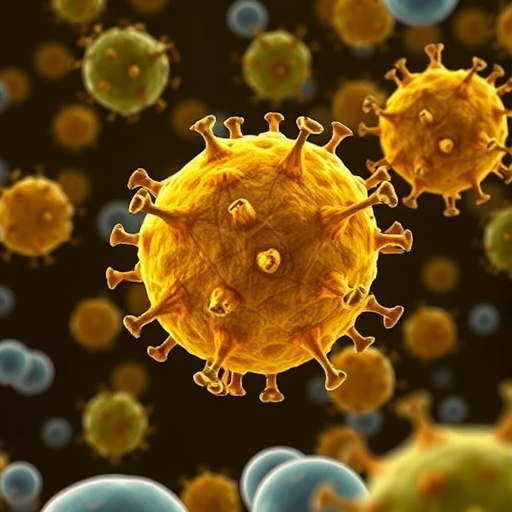Emerging research reveals a groundbreaking link between genetic regulation of exosome biogenesis and metabolic disorders such as obesity and insulin resistance, with significant implications for our understanding of cellular communication in human tissues. Exosomes, the nanosized vesicles released by cells, have long been recognized as pivotal mediators of intercellular signaling, delivering proteins, lipids, and nucleic acids that influence various physiological and pathological processes. While animal studies have illustrated a connection between altered exosome profiles and metabolic dysregulation, the specific genetic mechanisms controlling exosome generation and release in humans have remained largely elusive—until now.
A recent study published in the International Journal of Obesity by Das, Deep, Comeau, and colleagues delves into the genetic underpinnings governing exosome biogenesis pathways specifically within human adipose and muscle tissues. These tissues play critical roles in energy storage and glucose metabolism, and their dysfunction underlies conditions such as obesity and insulin resistance, which pose massive global health burdens. By integrating transcriptomic data and genetic association analyses, the researchers provide compelling evidence that variants influencing genes involved in exosome production are indeed linked with altered metabolic states.
Exosomes represent an intricate cellular communication system, and their biogenesis involves a highly coordinated sequence of intracellular events. Beginning in multivesicular bodies (MVBs) within the endosomal compartment, intraluminal vesicles are formed through inward budding before secretion as exosomes into the extracellular matrix. The process is orchestrated by a complex network of proteins, including those in the Endosomal Sorting Complex Required for Transport (ESCRT) machinery, tetraspanins, and Rab GTPases, among others. Dysregulation at any step can profoundly affect exosome quantity and composition, ultimately influencing the signaling landscape between cells.
Adipose tissue, traditionally viewed as a fat storage depot, is now recognized as a dynamic endocrine organ that releases numerous mediators affecting systemic metabolism. Muscle tissue is similarly a critical regulator of glucose uptake and energy expenditure. Both tissues produce exosomes that carry bioactive molecules impacting distant organs. The study highlights that genetic variation modulates the expression of genes involved in exosome formation in these tissues, consequently affecting the cargo and release of exosomes.
One of the most intriguing findings of this work is the association between polymorphisms in genes encoding components of the exosome biogenesis pathway and markers of insulin resistance. Insulin resistance—a state in which cells fail to respond effectively to insulin—precedes the development of type 2 diabetes and is closely linked with obesity. The authors identified that certain genetic signatures not only affect exosome production but also correlate strongly with clinical measures of metabolic disturbance, suggesting a mechanistic role.
By dissecting gene expression profiles from human tissue samples, the researchers constructed an integrative map connecting heritable genomic variations with exosome-related gene networks and metabolic phenotypes. This approach allowed them to pinpoint candidate genes whose regulatory variants could be used as biomarkers or therapeutic targets. The study advances the notion that exosome pathways are not passive but actively shaped by genetic factors contributing to metabolic disease susceptibility.
The ramifications of these findings extend far beyond academic insight. Exosomes could potentially serve as non-invasive biomarkers accessible through biofluids like blood, offering a window into metabolic health at a molecular level. Furthermore, targeting the exosome biogenesis machinery pharmacologically might open new therapeutic avenues to modulate intercellular communication and restore metabolic balance in obesity and diabetes.
These discoveries also highlight the intricate cross-talk between adipose and muscle tissues mediated by exosomes. The interplay of secreted vesicles facilitates the exchange of information that governs energy homeostasis. Genetic variations influencing exosome quantity or cargo composition may disrupt this communication, leading to maladaptive metabolic responses and disease progression. Understanding such mechanisms is vital as it suggests that treatments could be personalized based on an individual’s genetic makeup and exosome profile.
This study represents a leap forward in human molecular genetics related to exosomes and metabolism, moving beyond prior animal models to reveal human-specific regulatory axes. It emphasizes the importance of integrating multi-omics data to unravel complex biological systems and identify novel disease mechanisms. Importantly, it underscores that genetic factors impacting exosome pathways contribute directly to the pathogenesis of obesity and insulin resistance.
In conclusion, the genetic regulation of exosome biogenesis within critical metabolic tissues emerges as a fundamental component influencing obesity and insulin resistance phenotypes. The work of Das et al. provides a comprehensive framework linking heritable genomic variation to functional outcomes in intercellular communication, with broad implications for diagnosis and therapy. As obesity and diabetes rates escalate worldwide, uncovering such molecular insights offers hope for innovative and precision medicine approaches targeting these conditions at their cellular core.
The journey to fully decode exosome biology in human disease is ongoing, but this study marks a pivotal milestone by charting the genetic landscape that governs these vital nano-messengers. Future research building on these findings may illuminate how modulating exosome pathways can reverse metabolic dysfunction or even prevent disease onset. As the scientific community continues to explore the nexus of genetics, exosome biology, and metabolism, we move closer to unlocking novel interventions to combat the burgeoning global epidemic of metabolic disorders.
Subject of Research: Genetic regulation of exosome biogenesis pathways in human adipose and muscle tissue and their association with obesity and insulin resistance.
Article Title: Genetic regulation of exosome biogenesis pathway in human adipose and muscle tissue and association with obesity and insulin resistance.
Article References:
Das, S.K., Deep, G., Comeau, M.E. et al. Genetic regulation of exosome biogenesis pathway in human adipose and muscle tissue and association with obesity and insulin resistance. Int J Obes (2025). https://doi.org/10.1038/s41366-025-01933-z
Image Credits: AI Generated
DOI: https://doi.org/10.1038/s41366-025-01933-z
Tags: adipose tissue and metabolismexosomes in cellular communicationgenetic regulation of exosome biogenesisgenetic variants influencing exosome productionimplications for obesity treatmentinsulin resistance mechanismsintercellular signaling and healthmetabolic dysregulation in human tissuesnanosized vesicles in human physiologyobesity and metabolic disorderspathways of exosome formationtranscriptomic data in obesity research





